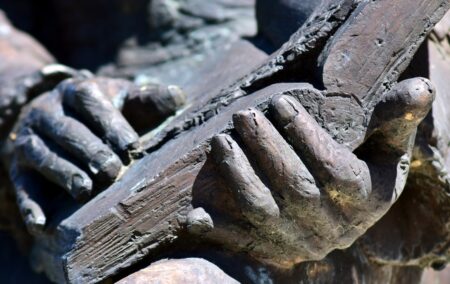When President Cyril Ramaphosa said in a virtual National Assembly exchange this week that ‘our people’ had been waiting ‘forever and a day’ for what he called ‘solutions’, I was reminded of the reported remarks of Desmond Tutu at a gathering in New York 36 years ago, on the eve of jetting off to Norway to receive the Nobel Prize.
Even today, we can regain a sense of the thrill of his audience at Manhattan’s Waldorf-Astoria Hotel in December 1984 when Tutu delighted in retelling one of his favourite tales about Christianity in Africa.
‘When the missionaries first came to Africa,’ the then general secretary of the South African Council of Churches told the assembled, ‘they had the Bible and we had the Land. They said: “Let’s close our eyes and pray.” We closed our eyes. When we opened them again, we had the Bible and they had the Land.’
All these years later, there is something amiss about the appeal of the backward gaze.
And, with the African National Congress having been the government for 26 of the 36 years since Tutu’s appearance at the Waldorf-Astoria, the same is all the more pointedly true of Ramaphosa’s reversion to the them-and-us thesis to explain South Africa’s failures.
Tutu’s story about the Bible and the Land – sometimes ascribed to independent Kenya’s inaugural president Jomo Kenyatta, but also variously described as an old African lament – underscores something of the discomfiture and contention but also the mercurial potency of the world’s most widely published text, and the habits, ideas and impulses the Bible has spawned over nearly 2 000 years.
It was, as I once wrote elsewhere, Tutu’s liberation lodestar, but also DF Malan’s in the crafting of South Africa’s inhumane apartheid episode.
But what ought to be altogether more discomforting at this time of livid, sometimes violent protests about race and injustice is that the Bible and all it brought also embodies the vast, complicated and hard-to-pick-apart endowment of ‘colonialism’.
So readily dismissed
A usefully obvious point to make is that Christianity was not a conception of the ‘white man’s world’ – so readily dismissed these days as the avatar of wickedness – even if its Western iterations often served European and distinctly imperial purposes.
Nevertheless, the Bible was a colonial import, along with – lest we overlook the range of it – sheep, smallpox, the telegraph, Islam, wheat, measles, football, the mirror, the clock, tuberculosis, the gun, calculus, the printing press and so on. To the end of the very long, and assuredly not universally or uncomplicatedly laudable list, one might add bronze.
The ancient alloy (some of the earliest artifacts, from the Iranian plateau, date back to the 5th millennium BC) is something of a problem child of colonialism, at least to the extent that the era’s monumental statuary – permanent, elevated and plinthed – is the in-your-face legacy that has for some time now enjoyed the attention of decolonisation enthusiasts.
But if it’s easy to topple an iffy grandee, what about the hymns, the wheat and the football?
Encouragingly, a more measured argument is emerging.
Just last week, Professor Adekeye Adebajo, director of the University of Johannesburg’s Institute for Pan-African Thought and Conversation, suggested that ‘monstrous monuments that continue to litter Western cities need not be destroyed’, but could be ‘put in museums or — as in Eastern Europe after the fall of communism — theme parks, where their historical significance can be contextualised and explained to the public to teach lessons from the past and avoid mistakes in future’.
Ineradicable presence
And the lessons matter. One is surely the ineradicable presence of our complex history in our daily lives, for better or worse – and, conceivably, more for the better.
After all, the sum of modernity (drawn from the long centuries of human endeavour stretching far beyond the confines of Europe or the expedients of colonial expansion) has delivered measurable benefits to millions who, just a century ago, were poor, subject peoples, denied the liberty and agency modern life has since secured.
Which is why, today, Tutu’s likeably cheeky story about the Bible and the land points to the most pressing – contemporary, wilful – outrage: the Ramaphosa government’s dogged commitment to subverting property rights, and so affirming rather than erasing a long history of dispossession. And this while the president himself, by a transparent sleight of hand, seeks to absolve himself by speaking of ‘the privileges that white people have always had in this country’, as if this, rather than policy failure, explains our plight.
‘Our economy,’ he said, ‘is where it is today because this country in the past focused on just a few and giving privileges to a few and not advancing privileges to all.’
This might have been true in 1984, when Tutu spoke in New York, but it rings hollow in 2020.
There is undoubtedly a lesson, here, and a mistake to avoid. We might well pray to hold on to some of those monuments after all.
If you like what you have just read, subscribe to the Daily Friend

